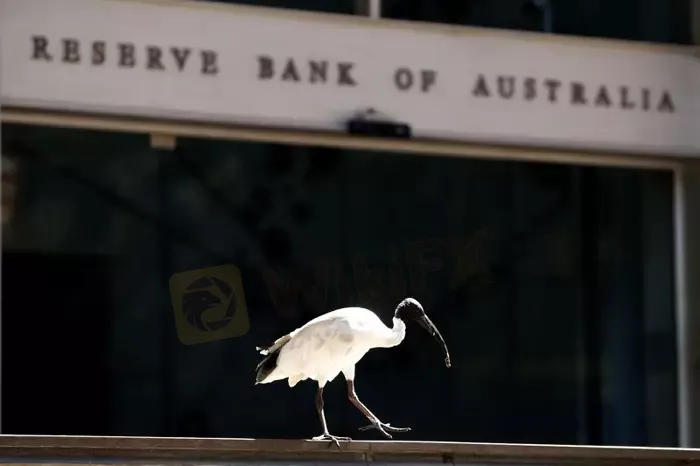简体中文
繁體中文
English
Pусский
日本語
ภาษาไทย
Tiếng Việt
Bahasa Indonesia
Español
हिन्दी
Filippiiniläinen
Français
Deutsch
Português
Türkçe
한국어
العربية
Australia’s central bank warns economy to slow sharply as inflation soars
Abstract:Australia’s central bank on Friday warned inflation was heading to three-decade highs requiring further hikes in interest rates that would slow growth sharply, making it tough to keep the economy on an “even keel”.

In its quarterly Statement on Monetary Policy, the Reserve Bank of Australia (RBA) jacked up its forecasts for inflation, downgraded the outlook for growth and foreshadowed an eventual rise in unemployment.
Yet even with further increases in rates, inflation was not expected to return to the top of its 2-3% target range until the end of 2024, pointing to a long period of pain ahead.
“It is seeking to do this in a way that keeps the economy on an even keel,” said RBA Governor Philip Lowe in the introduction to the 66-page statement.
“The path to achieve this balance is a narrow one and subject to considerable uncertainty.”
The central bank has already raised its cash rate four months in a row, taking it from an emergency low of 0.1 to a seven-year high of 1.85% and is flagging more to come.
“The Board expects to take further steps in the process of normalising monetary conditions over the months ahead, but it is not on a pre-set path,” said Lowe.
Markets see rates reaching 3.0% by Christmas and peaking around 3.30% in April next year.
The hawkish outlook reflects the fact policy makers have been badly wrong footed by inflation which has surged on the back of rising costs for energy, food and construction.
The RBA has had to lift its forecast peak for headline inflation to 7.75%, when as recently as May it had tipped 5.9%.
Core inflation is seen topping out at 6% by the end of this year and then declining only gradually to 3% by late 2024.
Lowe said these high levels risked getting built into wage- and price-setting behaviour, though so far longer-term inflation expectations had remained anchored to the 2-3% range.
Forecasts for economic growth this year were slashed by a full percentage point to 3.25%, while 2023 and 2024 were trimmed by around a quarter point to 1.75%.
“A higher cost of living, rising interest rates and declining house prices are expected to weigh on growth and spending,” said Lowe. After a bumper 2022, house prices are now on the retreat with Sydney seeing the fastest falls in 40 years.
The bank has also been surprised by the strength of the labour market, which saw unemployment hit a 48-year low of 3.5% in June. The RBA now see the jobless rate falling to 3.25% by the end of this year, before rising slowly to 4% by late 2024.
Annual wage growth is expected to pick up to 3.0% this year and 3.6% next, though that would still lag inflation. Wages could grow 3.9% in 2024 which would be the fastest in many years.
All these forecasts are based on the assumption that interest rates rise ti around 3% by the end of this year, and decline a little in 2024.

Disclaimer:
The views in this article only represent the author's personal views, and do not constitute investment advice on this platform. This platform does not guarantee the accuracy, completeness and timeliness of the information in the article, and will not be liable for any loss caused by the use of or reliance on the information in the article.
Read more

Bank Negara Malaysia Flags 12 New Companies for Unauthorised Activity
Bank Negara Malaysia (BNM) has updated its Financial Consumer Alert List (FCA List) by adding 12 more entities, reinforcing its efforts to warn the public against unregulated financial schemes. Check if your broker made the list!

TradingView Brings Live Market Charts to Telegram Users with New Mini App
TradingView has launched a mini app on Telegram, making it easier for users to track market trends, check price movements, and share charts.

March Oil Production Declines: How Is the Market Reacting?
Oil production cuts in March are reshaping the market. Traders are closely watching OPEC+ decisions and supply disruptions, which could impact prices and future production strategies.

How to Calculate Leverage and Margin in the Forex Market
Leverage amplifies both potential profits and risks. Understanding how to calculate leverage and margin helps traders manage risks and avoid forced liquidation.
WikiFX Broker
Latest News
Exposing the Top 5 Scam Brokers of March 2025: A Closer Look by WikiFX
Gold Prices Climb Again – Have Investors Seized the Opportunity?
Webull Launches SMSF Investment Platform with Zero Fees
Australian Regulator Warns of Money Laundering and Fraud Risks in Crypto ATMs
The Withdrawal Trap: How Scam Brokers Lure Victims into Paying More
FCA to Investors: Think Twice Before Trusting These Brokers
Trump\s tariffs: How could they affect the UK and your money
Trump gambles it all on global tariffs he\s wanted for decades
TradingView Brings Live Market Charts to Telegram Users with New Mini App
HTFX Spreads Joy During Eid Charity Event in Jakarta
Currency Calculator







